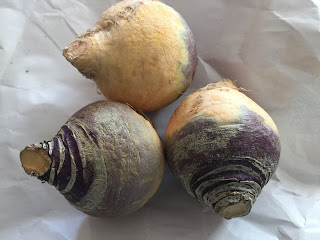 |
| You say Potato, I say Potawtoe - You say Parsnip, I say Parsnip - You say Turnip, I say Rutabaga |
Actually, you may
be saying “waxed turnip,” but no matter what you say, when the word rutabaga is
uttered out loud you can’t help sounding as if you're from Boston, or is it Jersey? I’m fairly
certain those two accents are not the same, but for some reason I can’t tell
them apart in my head at the moment.
However, I am pretty sure those few times when you do say rutabaga you’re not really sure what the difference is between turnips and rutabagas. So I will enlighten you.
Turnips are an
easy to grow and popular European root vegetable. Rutabagas are also an easy to grow, wildly
popular European root vegetable. The Swedes
and the Finns are especially fond of rutabagas.
Both these Cinderella-like veggies can be boiled and mashed (like
potatoes and parsnips and cauliflower, alone in a combination of), sliced or
diced and roasted in olive oil and a good pinch of pink Himalayan salt, cubed or
grated then fried with some butter and fresh herbs (like latkes) or simply julienned
and eaten raw in salads. Rutabagas often commonly referred to as
“Swedes” (“Neeps” in Scotland) or yellow
or waxed turnips until the late ‘60’s but the term waxed or yellow was
confusing for the average store clerk and consumer so rutabaga is now the label
seen in your produce section of the market.
They are larger in size than turnips, have flesh that is more yellow in
coloring, with a swipe of purple, carry a bit more starch than turnips and have
a longer shelf-life. Both these cool
weather relatives of the cabbage family are available year round, with peak
season for turnips from October to about February and rutabagas peaking from
July through April . . . wait, what?
According to several other resources detailing what’s in season now,
this is the season for rutabagas. As a matter of fact harvesting is going on as I write this Blog in Washington State, Maine, Canada
and Siberia. Makes sense with its frost
hardy propensities and love of long cold seasons and moist soils. Whew! that was close – so I will continue with rutabaga as my
seasonal Rr food of the month.
When asked about the
similarities or differences in taste between rutabagas and turnips, I encourage
those inquiring to sample them side by side, taking a bite of one then the
other. The rutabaga you will find is a bit sweeter,
especially when roasted. Higher in
starch content, of course that would make them sweeter and they are easier to peel
than turnips. Both turnips and rutabagas
are strong in potassium (rutabagas more so), vitamins A and C as well as
carrying a bit of fiber. And rutabagas
have almost half as much natural sodium in them than turnips.
 So what do we do
with these bi-colour, bulbous things you ask? Think in terms of a substitute for potatoes, parsnips and cauliflower. Since my eldest son is a smashed potato connoisseur, I decided to test his taste
buds by adding rutabaga to his favourite smashed potato recipe. For myself some ruta-fries.
So what do we do
with these bi-colour, bulbous things you ask? Think in terms of a substitute for potatoes, parsnips and cauliflower. Since my eldest son is a smashed potato connoisseur, I decided to test his taste
buds by adding rutabaga to his favourite smashed potato recipe. For myself some ruta-fries.Ingredients
1 russet potato - washed and peeled
2 rutabagas - washed and peeled
1-2 tablespoons olive oil
1-2 teaspoons kosher salt
1-2 teaspoons ground pepper
1/8 teaspoon cayenne pepper
Slice peeled potato and rutabagas into thin rectangles. Spread slices onto a sheet pan lined with parchment paper. Evenly drizzle olive oil all over potato and rutabaga slices then sprinkle with salt, pepper and cayenne. Using your hands, move seasoned potato and rutabaga slices all around, mixing olive oil and seasonings onto both sides of the slices. Bake in 400 degree, preheated oven for about 35-40 minutes, until crispy and golden brown.
 |
| These are absolutely delicious and they're baked which makes them even better for you! |
Recipe for Potato-Rutabaga Smash
Ingredients
1 russet potato - washed, peeled and cut into medium cubes
2 rutabagas - washed, peeled and cut into medium cubes
4 tablespoons unsalted butter
1/4 cup whole milk 1/4 cup sour cream
1/4 teaspoon garlic powder 1/4 teaspoon dried dill
salt and pepper to taste
Procedure
Place cubed potato and rutabagas in large saucepot and fill with water to about 2 inches above vegetables. Bring water to a boil, then reduce to simmer and cook until vegetables are soft but not mushy. Drain ALL the water from saucepot and using your potato masher or potato ricer, begin smashing. Add milk and mash some more. Add sour cream and mash a little more. Finally add all the seasonings and give the mixture a final mashing until it is the consistency you prefer. I like a few lumps in my smashings, something to bite into. My son loves the smooth, creamy version.
 |
| The yellowish cubes are the rutabagas, the whiter ones are the russet |
 |
| Rutabaga Smash topped with gravy and garnished with dill |





No comments:
Post a Comment